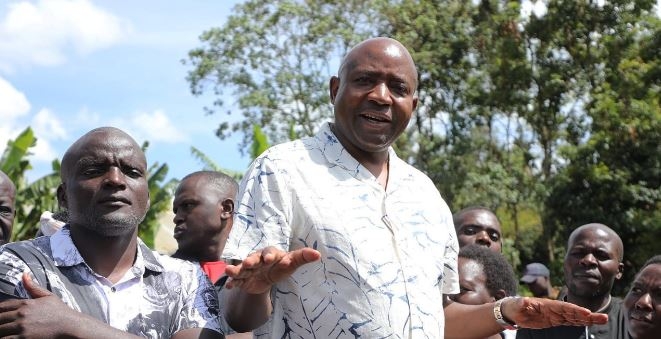 Kenya Comprehensive School Headteachers Association national chair
Fuad Ali at Sheikh Zayed Hall in Mombasa on Monday / BRIAN OTIENO
Kenya Comprehensive School Headteachers Association national chair
Fuad Ali at Sheikh Zayed Hall in Mombasa on Monday / BRIAN OTIENO
Comprehensive school headteachers have opposed the
proposal by junior secondary school teachers to move the management of Junior
Secondary to senior secondary schools.
JSS teachers are pushing for their separation from
primary institutions, seeking independence from the comprehensive schools'
management.
Kenya Comprehensive School Headteachers Association
chairman Fuad Ali, however, on Monday maintained that the decision was reached through
the Presidential Working Party on Education Reforms and all stakeholders were
involved.
Ali warned JSS teachers against introducing union
politics to the day-to-day running of schools.
He said seeking independence is akin to saying they
are slaves, yet no one is a slave in the country’s education system.
“Junior schools being under comprehensive schools was
the opinion of all Kenyans who were consulted widely under the Presidential
Working Party on Education Reforms.
“If there is the best thing that was done in
Kenya, it was placing junior schools under comprehensive schools,” Ali said.
He said the junior school learners have integrated
well with their comprehensive school counterparts and built strong bonds
because of the excellent leadership that the comprehensive schools have.
“If there was no leadership, we would not have
been able to ensure the smooth completion of the Grade 9 assessment across the country,”
Ali said.
He spoke at the 2025 Kenya Comprehensive School
Headteachers Association/KCB national annual general meeting and conference in
Mombasa, where over 15,000 headteachers have converged.
Ali said there is no leadership vacuum in their
institutions, having overseen the successful completion of Kenya Primary School
Education Assessment (KPSEA) and Kenya Junior School Education Assessment (KJSEA).
“We have successfully completed the first phase of
CBE at Grade 9. As we speak, we have done assessments for Grade 6 and Grade 9
without any security personnel.
“It was from the container to the schools and
these 15,000 headteachers here are the ones who ensured all was smooth. That
means their leadership is sufficient,” Ali said.
He said they are handing over junior school
learners to senior schools having become competent learners and having
developed their leadership skills.
“This CBE makes learners more engaged and empowered
to become ethical students. They have no qualms about telling you what is in
their hearts. They point out what is wrong and what is right to your face,” Ali
said.
He said the CBE engages the brains of the children
effectively.
The Kecsha national chair also urged the
government to increase the capitation to comprehensive schools.
He acknowledged that they are happy with the capitation
to junior schools.
He also called for the construction of more
laboratories to help learners grasp concepts more effectively and efficiently.
“This responsibility is not the government’s only.
We want more stakeholders to chip in like the Kenya Commercial Bank who have
walked with us for a long time,” Ali said.
Many schools, he said, are also looking for partners
on their own so as to bridge the infrastructure gaps that exists in
comprehensive schools, which is commendable.
“More educational stakeholders should come out and
help build infrastructure in schools. The more we educate our children the more
we build our nation.
“Poverty can only be fought using education,” he
said.
INSTANT ANALYSIS:
Junior school teachers are pushing for their schools to be separated from primary schools and managed under senior secondary schools or, preferably, gain full autonomy. They argue that the current system is undermining the competency-based education, citing issues like heavier workloads, lack of proper facilities (like laboratories), unclear career progression, and a mismatch between primary-trained heads and secondary-level needs. This push for autonomy aims to create an independent leadership structure with separate principals, resources, and financial management.
















